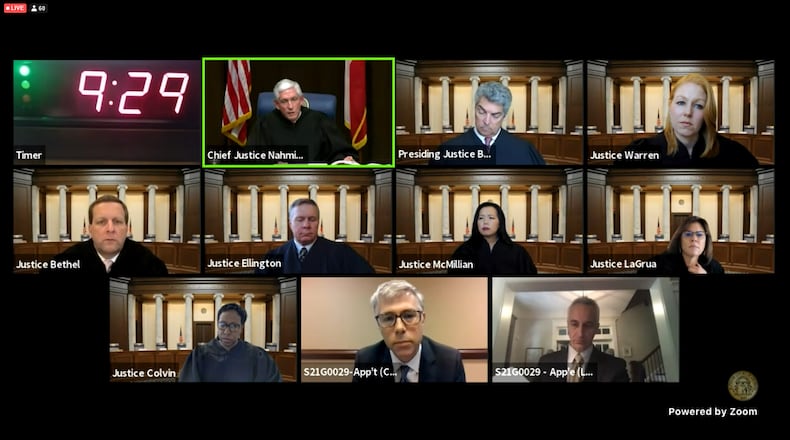For years, property owners have been having cars booted if the vehicles are left parked in their lots without authorization.
If arguments before the Georgia Supreme Court on Wednesday are any indication, such actions by property owners will not be legal without local legislation that allows it. At one point, the court’s chief justice called a property owner’s arguments “crazy” and “nutso.”
The state high court is considering a class-action lawsuit filed by Forrest Allen, whose tractor-trailer was booted after he parked it at the Wesley Chapel Crossing Shopping Center in Decatur in February 2018. He had to pay a $650 fee to have the boot removed.
So far, a Clayton County judge and the state Court of Appeals have allowed Allen’s case to go forward. Wesley Chapel Crossing is appealing that latest decision. The state Supreme Court’s decision is expected in the coming months.
The shopping center is supported in court filings by several local vehicle immobilization companies that note there are similar lawsuits pending in the lower courts and contend an adverse ruling could destroy their businesses.
Interestingly, the outcome of the case might turn on centuries-old common law that said landowners could seize trespassing livestock on their property to secure compensation for any damage the animals may have caused. And that precedent presented big problems for Marietta lawyer David Conley, who argued the case on behalf of Wesley Chapel Crossing.
Conley started off his argument by saying property owners have a “self-help right” to boot unauthorized vehicles for the purpose of exercising control of their parking lots and to exclude trespassers.
“Why is that excluding?” asked Justice Sarah Hawkins Warren. “Why isn’t that detaining?”
“It’s detaining the vehicle there at the moment,” Conley responded. But it also deters future trespassers and protects the property, he said.
Chief Justice David Nahmias was not buying it.
“That may be your theory, but that was not the common law right,” he said. “It was always categorized as a remedy for a certain type of trespass.”
The common law right was not to deter, it was a way for a landowner to be compensated for any damage, Nahmias said.
When Conley argued there should be certain remedies to “cure a trespass,” Nahmias disagreed again.
“It is a crazy thing to say the normal cure for an unauthorized entry on your property is to insist that the trespasser remain on your property,” the chief justice said. “I mean, that’s nutso under any conception of the law. … Where in the world can you say a cure for trespass is to continue the trespass?”
Conley responded, “I disagree that it’s either crazy or nutso to do so. I believe businesses do so because it is effective in curing or avoiding trespassers.”
Nahmias told Conley that property owners have two legal options they can use as a remedy.
“Tow it away, impound it, and they don’t get their car back until they pay the fees,” Nahmias said. “Or sue them for trespass. You know who they are. You know the damages.”
Conley also argued that drivers had in essence consented to having their vehicles booted if they were there without authorization because of warning signs posted in parking lots.
But Hawkins disagreed.
“The consenting part of your argument is the most troublesome to me,” she said. “I think it conflates notice and consent.”
Atlanta lawyer Frank Lowrey, who represents Allen, encountered few, if any, pointed questions from the justices.
About the Author
Keep Reading
The Latest
Featured



